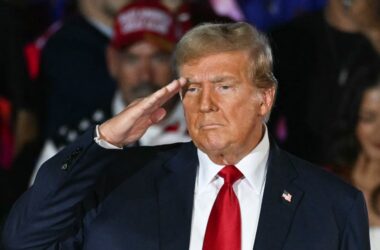Amid the ongoing political turbulence surrounding U.S. policy toward Ukraine, one rare area of bipartisan agreement in Washington has emerged: growing exasperation with Andriy Yermak, chief of staff to Ukrainian President Volodymyr Zelenskyy.
Yermak, often regarded as the second most powerful figure in Ukraine, has proven to be a particularly difficult counterpart for U.S. officials—especially under the Trump administration. According to interviews conducted by Politico with 14 sources, including congressional aides and former U.S. and Ukrainian officials, Yermak’s frequent visits to Washington have left a trail of frustration. Critics say he lacks a clear understanding of American politics, often comes off as abrasive or overly demanding, and fails to grasp the procedural and political norms of Capitol Hill.
Some officials also worry that Yermak has misrepresented U.S. positions in his communications with Ukrainian leadership, potentially contributing to strained ties at a time when Ukraine remains heavily reliant on American support in its defense against Russia’s ongoing aggression.
Described by one source as a “bipartisan irritator,” Yermak’s approach has reportedly alienated both Democratic and Republican officials, especially as President Donald Trump pushes for peace talks between Kyiv and Moscow—a policy seen by many as favoring Russia. Trump’s broader deference to Vladimir Putin further complicates the situation.
In a statement provided via spokesperson, Yermak defended his conduct:
“If that means being considered ‘challenging’ by others — so be it. I will wait many more hours outside any door if that helps my country and my president’s mission.”
He also acknowledged his limited familiarity with U.S. political mechanics, saying he came to Washington to advocate for Ukraine, not to master American politics.
Zelenskyy recently missed a planned meeting with Trump at the G7 summit after the U.S. president departed early, citing tensions in the Middle East. It remains uncertain whether the two leaders will meet at the upcoming NATO summit, where Ukraine is expected to receive less attention as leaders seek to avoid confrontations with Trump.
While Biden administration officials also expressed frustration with Yermak, they were generally more willing to work with him due to the stakes of the conflict. However, the Trump administration has shown far less patience.
On a June visit to Washington, Yermak struggled to secure high-level meetings. A planned sit-down with Secretary of State Marco Rubio was abruptly canceled, and Yermak was left waiting outside the office of Trump’s Chief of Staff Susie Wiles before the meeting was scrapped. Vice President JD Vance’s office reportedly did not respond to his request for a meeting.
Still, Yermak did briefly cross paths with Rubio at the White House, later posting a photo on social media. According to his team, that meeting and a truncated conversation with Wiles did occur—though White House officials disputed that account.
The official objective of the trip, according to Yermak’s spokesperson, was to brief U.S. senators on the battlefield situation and discuss further sanctions on Russia. However, multiple sources described the visit as disorganized and lacking a coherent agenda. “We don’t know why he’s here,” one attendee reportedly said.
Yermak’s long-standing difficulty navigating Washington’s power structures stems in part from his background. A former film producer, he rose to prominence as a close confidant of Zelenskyy but has been criticized for lacking diplomatic finesse. One source said he mistakenly believed that a minerals investment agreement with the U.S. could be traded for security guarantees—an idea described as “ludicrous.”
Further complicating matters, Yermak has allegedly accused Trump officials of being Russian assets, including Trump’s Middle East envoy Steve Witkoff, who has reportedly met with Putin several times as Trump tries to initiate negotiations with Moscow.
Some in Washington worry that Yermak’s actions risk damaging Ukraine’s most important alliance.
“There is a serious mistrust with the Zelenskyy administration at this moment,” said Ron Wahid, chair of Arcanum Global and an informal adviser to Ukraine peace efforts. “Zelenskyy needs to make an earnest effort to reset the relationship.”
Though the June trip included meetings with General Keith Kellogg, Trump’s envoy to Ukraine, and Deputy Secretary of State Christopher Landau, it was viewed as unsuccessful by many involved. One source labeled Yermak an “existential liability” for Ukraine.
Zelenskyy’s deep personal and political reliance on Yermak may make change unlikely. Despite persistent concerns from U.S. officials, Zelenskyy has repeatedly refused requests to limit Yermak’s presence in key meetings, according to sources familiar with diplomatic exchanges under both the Biden and Trump administrations.
Under Biden, officials attempted to work more constructively with Yermak, even helping him refine his messaging to Washington. Yet frustrations remained. Secretary of State Antony Blinken and former Ambassador to Kyiv Bridget Brink reportedly asked for some meetings with Zelenskyy to occur without Yermak—a request ultimately rejected by the Ukrainian president.
Yermak’s presence may further empower anti-Ukraine voices in Trump’s circle, one source warned:
“All the people here who want to withdraw and abandon Ukraine are thrilled to have Yermak around.”
As Trump returns to the White House and seeks a swift resolution to the war—primarily by pressuring Ukraine to negotiate—Zelenskyy faces a difficult balancing act. The future of U.S. support may depend, in part, on whether Kyiv can repair fraying ties in Washington, and whether Zelenskyy is willing to reconsider the role of his most polarizing adviser.




